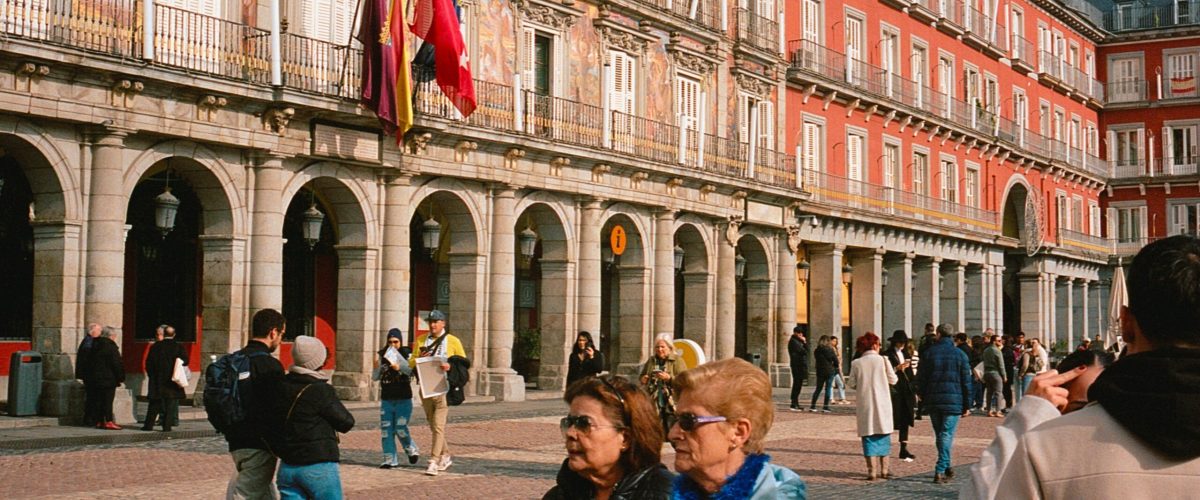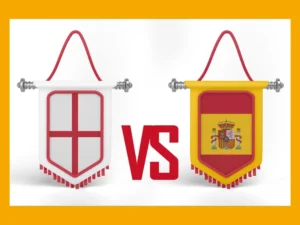
Speak Like a Madrileño: 5 Fun Spanish Words You’ll Hear Everywhere
Hola and welcome to La Aventura Española! If you’re planning to move to Madrid, or you’ve just arrived, this post is for you.
Whether you’re here for work, studies, love, or just a few weeks of vacation, these first days in Madrid can be exciting… and full of new expressions! Spanish in Madrid is full of local words that you won’t always find in textbooks.
Today, we’re diving into five very typical “Madrileño” words, words born in Madrid or used so much here that they’ve become part of the city’s identity. You’ll hear them in bars, in schools, and on the streets, so keep your ears open and get ready to sound a bit more like a local.
1. Mazo, “A lot” or “Very”
This is one of the most famous Madrid slang words, especially among younger people. You’ll hear it everywhere!
Examples:
- “Esta chaqueta es mazo chula.” → This jacket is really cool.
- “Este libro es mazo interesante.” → This book is super interesting.
- “Aquí hay mazo de gente.” → There are a lot of people here.
“Mazo” is a colloquial way to say “muy” (very) or “mucho” (a lot). It’s mainly used by people between their 20s and 40s, though you might hear it beyond that age range too.
If you say “mazo” anywhere in Spain, people will understand you, but they’ll immediately know you’ve spent time in Madrid.
2. Tronco / Tronca, “Dude / Bro”
“¡Qué pasa, tronco!” is a phrase you’ll hear in Madrid all the time, especially from locals over 30.
“Tronco” (for men) and “tronca” (for women) mean something like “dude” or “bro.”
Examples:
- “¡Ey, tronco! ¿Cómo va la vida?” → Hey dude, how’s life?
- “¿Qué pasa, tronca?” → What’s up, girl?
The word became popular in the 1980s, especially among young people in Madrid. It was used the same way “tío” or “tía” (guy/girl) is used today —not referring to family, but as a friendly, informal way to address someone.
Nowadays, younger generations (around 20 or under) rarely say “tronco.” They’ve replaced it with the English loanword “bro.”
So:
- Over 30? → You might still say “tronco.”
- Under 25? → You’re probably saying “bro.”
3. Chupa, “Jacket”
As the weather cools down, you’ll hear people talking about their “chupa.”
Originally, “chupa” referred to leather jackets worn by bikers in the 1980s.
Today, it can refer to almost any kind of jacket, though most people still picture a leather one when they hear it.
Example:
- “Ponte la chupa, que hace frío.” → Put on your jacket, it’s cold.
It’s a great example of how slang words in Madrid evolve but keep their roots in local history and fashion.
4. Mini, A Big Drink (Not a Small One!)
This one might surprise you!
In Madrid, if someone orders “un mini”, they’re not asking for something small. In fact, it’s the biggest drink you can get.
A mini usually refers to a 750 ml plastic cup filled with beer, sangría, or tinto de verano (a red wine and soda mix). It’s often shared among friends with straws.
Example:
- “Nos pedimos un mini de cerveza para compartir.” → Let’s get a big beer to share.
So, when you hear “mini,” don’t expect a small glass, it’s actually quite the opposite!
5. Búho, The Night Bus
Here’s a useful one for your nights out in Madrid.
The night buses in the city are called “búhos” (owls). The name comes from the nocturnal bird and because these buses run only at night.
Example:
- “Voy a pillar el búho.” → I’m going to catch the night bus.
- “¿Sabes dónde para el búho para Alcobendas?” → Do you know where the night bus to Alcobendas stops?
So next time you’re out late, and someone says they’re taking “el búho,” you’ll know they’re talking about Madrid’s night transport system, not an actual owl!

More Than Words: A Glimpse Into Madrid’s Soul
Madrid isn’t just Spain’s capital, it has its own rhythm, style, and even its own slang.
Words like mazo, tronco, chupa, mini, and búho are part of what makes the city’s Spanish so colorful and alive.
So, next time you’re chatting in a Madrid café or out at night with friends, try dropping one of these words you’ll sound mazo m
adrileño in no time!
Want to know more about Madrid slang words? Watch the video below!







